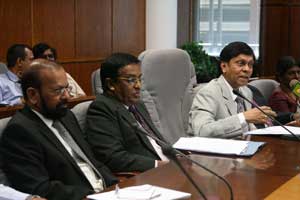
From left – Bank of Ceylon Chairman Gamini Wickremasinghe, Seylan Bank Chairman E. Narangoda and Central Bank Governor Ajith Nivard Cabraal at a briefing this week on Seylan Bank. |
|
The Central Bank announcement this week that it has settled its foreign currency commercial loan obligations of US$175 million without any adverse effect on the country's balance of payments and without pressure on the exchange rate, cheered some economists but not all.
Dr. Sirimal Abeyratne, a lecturer at the University of Colombo, said it was good news. “The CB was able to manage such outflow of foreign currency without any adverse effects ‘due to the consistent and prudent build up of reserves during the period of the inflows’," he said.
But another economist, now retired from an international lending agency, said the Central Bank was again embarrassing itself by making poor or non-arguments. “First, repayment of foreign loans is a contractual obligation that the Government or the Central Bank has to do, otherwise it would have to default and Sri Lanka will suffer as a result, as no one will extend credit to us,” he said, adding that the issue also is what did these loans contribute to development and borrowed at high rates.
“Why did they borrow to ‘defend’ the rupee, keeping it appreciated and harming our exports? Foreign borrowing for such a purpose was wrong in the first instance,” he said.
A statement by the CB said the US$175 million loan settlement included a settlement of US$100 million syndicated loan arranged by Citicorp Investment Bank (Singapore) Ltd in December 2005, the settlement of the remaining balance of US$25 million out of a loan obtained through Citibank in September 2003 with the assistance of NEXI of Japan and the repayment of US$50 million loan obtained from ICICI Bank of India in October 2007 through the National Savings Bank. The CB further stated that since the new foreign currency commercial borrowings during 2008 was limited to only US$150 million, the total external foreign currency commercial debt stock declined from US$485 million at end 2007 to US$460 million at end 2008.
Dr. Abeyratne said the point is obviously true as the total gross foreign exchange reserves that the CB had by the end of June 2008 was just US$3 billion. "Out of this, more than a half a billion is spent for the above payments," he said. "Moreover, the amount of foreign reserves remaining by the end of the year is perhaps less than US$ 2 billion or even less."
Dr. Abeyratne said the reduction in the import prices and the country's huge oil bill has made the burden easier. "However, the reduction in import prices is not something to be happy about because it is the result of the sharp decline in world prices due to the financial and economic crisis affecting our foreign export earnings as well."
According to CB information, the trade deficit has already increased by 88% from January to September 2008. World economic growth is slowing down from 5% in 2007 to 3.7% in 2008 and is forecasted to decline further to 2.2% in 2009 with the contraction in output in industrialized countries by 0.3%. "Therefore 2009 will be a tough year in which managing the balance of payments and exchange rate even with further borrowing from abroad is going to be difficult," he said.
The retired economist asked, “why did foreigners hold Sri Lanka Treasury Bond and Bills and then take them out by encashing them?” This, he said, was due to economic uncertainty and the markets anticipating a further worsening of the economy and a devaluation. “It was not due to the financial turmoil in the developed countries,” he said.
He pointed out that the departure of the funds is due to deteriorating domestic economic conditions. “It is also a good thing that the Government's external debt liability stock has fallen as per the first point.
The Government had to do it. But the important point is how they are going to finance the large trade and current account deficits in the near future ? This so-called explanation avoids that crucial issue, and this is when Sri Lanka's borrowing terms are worse now with both Fitch and S&P downgrades,” he said.
|

